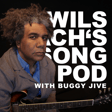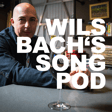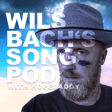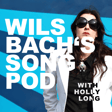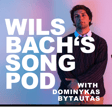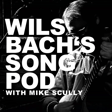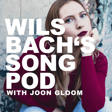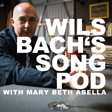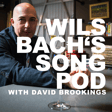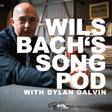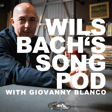Introduction to Tim Willsbach's Podcast
00:00:01
Speaker
Welcome to Willsbach's SongPod, a show where we dig deep into the songs and artists that move us and how we're moved to craft the songs we write. I'm Tim Willsbach and I write, release and perform music as Willsbach and you can find me anywhere you stream music. Let's dig in.
00:00:17
Speaker
Originally from New York and following in the footsteps of rock and roll royalty like Bruce Springsteen or the band, my guest today released his debut solo album, Next Stop, Bedford Avenue in 2003, toured the US, Canada and Europe opening for acts like Nora Jones, Steve Earle, Ray La Matanya, Chief Trick,
00:00:34
Speaker
Early in his career, he worked as an engineer's assistant at the legendary Hit Factory. That eventually led him to a mentor-mentee relationship with people like Taimi Lekuma, who would guide him to become the director of college marketing of a label. That experience sent him into a career in marketing that would largely sidetrack the music career for most of the 2010s. He officially returned to music with the 2023 release of the album Bizarre with his band Nine Mile Station.
Meet Will Hawkins: From Music to Marketing and Back
00:00:57
Speaker
Please welcome to Willsbox Songpod, Will Hawkins. Hey man, thanks for having me. Really appreciate it.
00:01:03
Speaker
So I did just a little internet dive. Did I get all that right? You did get a lot of that right. Yeah, that's terrific. I didn't realize there was that much information about me. So yeah, so you're kind of like me. Like I had I had a big my identity back in, you know, 90s, early 2000s was music.
00:01:23
Speaker
with this TV thing that you also did on the side. And then 2008, 2009, that kind of time, I kind of put the music away a little bit and really kind of dove in and focused on the...
00:01:34
Speaker
on the TV career and then came back to the music like 2019, like more full time. It's never put it away. I don't think you're probably like me. You can't actually ever put it away. But is that the same kind of thing that you did? It was similar. Yeah. When I first got out of school, I was playing in bands in New York City and I happened to get a job at Hit Factory, which led to a job at
00:01:56
Speaker
at the time, GRP records and that was impulse records and that was Verve. So I was working with a lot of really big jazz names in this first in the studio. And it was really intimidating to be in the in the studio of people like the Brecker brothers or George Benson or Diana Crow and see like just their musicianship and professionalism and then go back and listen to my demo. That was nowhere near what they were doing. But I didn't at the time, I didn't give myself
00:02:26
Speaker
like a break, like they had been doing this for decades. And here I was a 20 something year old kid trying to like put a rock band together. But I worked at labels for about 10 years. I left
00:02:40
Speaker
the audio engineering part and became more marketing and then ANR and radio and I kind of got to see how the sausage got made on the other side. And then I was working for Capitol Records towards the end of the 90s and I was working with Gary Gersh was the CEO at the time and Glenn Ballard had a label that I worked with.
00:03:01
Speaker
And when Gary got fired, how it works at studios and labels, when the big guy gets fired, everyone who he brings in gets fired, too. So that's what happened. We all got let go.
00:03:13
Speaker
And I didn't have much of a career, so I didn't have anything to fall back on. So I ended up back in New York and I started working for Fox Sports and I was doing integrated marketing there and doing more what became like event marketing, experiential marketing. And I had a career, I still have a career as an event producer. So I had put out an album in 2003 and 2007
00:03:37
Speaker
And they did okay, like the reviews were good. And at the time you were selling actual physical CDs. Right. So I made some money, but certainly wasn't making the kind of money that I could raise a family on. And around that time, I was doing a lot of freelance work in an agency I was with offered me a full time job for some like real adult money. And I was like, well, all right, well, let's try being able to pay your rent.
00:04:02
Speaker
for a little while, and I had some success in that. I really enjoyed the work, and I didn't make a whole lot of music during that 10-year period. My creative juices were flowing as a creative director and coming up with ideas for marketing campaigns, and music was kind of like an ex-wife that I didn't want anything to do with, because it triggered so much
00:04:34
Speaker
I was happy not making music for a while, and I was actually enjoying going to see music and listen to music, but I didn't really miss making music for a while.
Inspiration and Return to Music
00:04:45
Speaker
I started inching back into it around 2014.
00:04:49
Speaker
I don't know, 2016, 2015. And then my mom had a stroke in 2017. I went back to New York to take care of her. And after she passed away later that year, I found myself in a really, really dark place. I was the grief was just seemed insurmountable at the time. And I had just sold an agency that I had built. So I was out of work. I wasn't doing very much except just I couldn't leave the house.
00:05:17
Speaker
And one day I just had this epiphany that my mom wouldn't want to see me so sad. She wouldn't want to see me in such a dark place. So I was like, well, what kind of advice would she give me right now? Which would be, what makes you happy? Do something that makes you happy. And music always made me happy. And she was always a big supporter of me as a musician.
00:05:41
Speaker
So I just started like banging out writing songs. First, I hadn't written anything like seven or eight years. I hadn't even tried. And the songs that I was writing were not sad songs. You think you might be writing sad songs when you're in a sad place, but I didn't need more sadness. I didn't need to dig a hole deeper of how I was feeling. So the songs I was writing was more like there's something better down the road. Things are going to be okay, more optimistic things, almost maybe even just telling myself that things are going to be all right.
00:06:12
Speaker
And I started doing those songs out at open mics and, you know, little songwriter showcases. And ultimately that created a band. People like I found people that really dig in the music, which led me to Fernando Perdomo, who is in a movie called Echo in the Canyon that celebrates the music of the Los Angeles Canyons. And we put a band together called Nine Mile Station. And we worked with Al Schmidt, who is an old mentor of mine. Al won 26 Grammys in his lifetime.
00:06:41
Speaker
He worked with everybody from Paul McCartney, Bob Dylan, Barbara Streisand, Elvis Presley. I mean, you name it, the guy worked with it. And then Nico Bolas worked on it too. And Nico won Grammys with Melissa Etheridge and Shelby Lynn. And he also worked with Toto. And the two of them really elevated the work that we were doing. And it really opened me up again. And then during the lockdown, I didn't have anything to do
00:07:09
Speaker
Events were closed. The business was closed. So I spent my days in the recording studio. So I came out of the pandemic of 18 months worth of songs recorded. And it was the first time in my life I was really able to be that artist without having to be anything else. I didn't have a side job. I didn't have a job. I didn't have any other responsibilities. Everything was shut down. So it was the first time I was able really just to be the artist that I always wanted
00:07:40
Speaker
And that kind of and that led me out to where I am now, where I'm writing more like I have a solo record that's coming out hopefully in the fall. I'm working on it now with Fernando and Russell Ted Russell Camp. And it's I came out of the COVID a different person, but really just and music saved me in a lot of ways. And the people that I started spending time with friends were all musicians again.
00:08:10
Speaker
So this message that my mom gave me, which is be happy, go make music completely changed my life. Yeah. You know, I don't know where I would be right now without it. It's just, it's, it's all encompassing at this point. Like music is every day. Those first few songs that you wrote after your mom passed is kind of those became what, what bizarre. Yeah. So the first song that I kind of finished was caught in the rain. Okay. I woke up one morning and I just started
00:08:39
Speaker
playing the chords and the song just came out of nowhere, but it started out as, are you, do you know what a murder ballad is? Uh, no, I think I've heard that term before, but I'm not sure I know what that is. So back in the twenties, there were like the, a murder ballad is almost like a rap song of the twenties where these gory songs of like revenge of people doing like a lover doing you wrong. So I had an old fiance that, that left me for her boss.
00:09:08
Speaker
And the night that I found out that she was leaving, it was a big snowstorm in New York. And the song started out where you got caught in the snow, and that just wasn't very distant work. So I just changed it to The Rain. And at first, it was a real vengeful song. And it was funny to me. And I'd play it for people, and they were more shocked than funny.
00:09:33
Speaker
But it was catchy, so I kind of rewrote the song and it became I got caught in the rain, but it's it's about someone who's cheating on you and getting caught and their alibi is I can't get home. You know, where are you? Where are you? You should be here. Like, well, I can't get there. It's raining. I can't. You know, it's a big storm. I can't get to you.
Songwriting and Creative Process
00:09:51
Speaker
Yeah. And in the original version, the guy in the song kills his girlfriend. And then when the police come back around and say, hey, man,
00:10:01
Speaker
Where were you? I don't know, man. I got caught in the rain. I wasn't home. So the song kind of circled back. But it was fun. It made writing fun again. And it was catchy. I got caught in the rain, and I can't get home. Got caught in the rain, and I can't get home. Got caught in the rain.
00:10:40
Speaker
You mentioned it's a catchy song. It's super catchy. That hook is kind of undeniable. Do you go to a song with that in mind? Do you kind of start with the hook sometimes? Do you start with the lyric? What's the balance there?
00:10:59
Speaker
I don't know. Sometimes it's different each time. I'll give you an example. Post Malone, Sunflowers from the Spider-Man soundtrack. It has that long intro, but I was singing along to it and I came up with an alternative melody to that. Okay.
00:11:17
Speaker
And then I started arranging the new song over some of what Post Malone did. And it's a song called, Can I Drive You Home? And I was with somebody at a cowboy bar and she's a big two stepper. And when we get there, she goes, look, I just.
00:11:35
Speaker
I need you to know that I come here alone and I dance with everybody. We're all dance. We come here to do two steps. So there's going to be Cowboys that come up and ask me to dance. I hope it doesn't bother you. I'm like, I don't care. Go ahead. As long as I don't have to do it. So sure enough, like.
00:11:50
Speaker
Cowboys of all ages came up and she went two steps. She came back and I could see in some of the Cowboys eyes that they were hoping that this meant more. Right. So the song was like you can dance with all these cosplay Cowboys all you want. I know I'm leaving with you. Yeah.
00:12:07
Speaker
So me listening to Post Malone ended up becoming more of an Americana country song. And what started out as like synthesizers over a synth bass got translated into this completely other song. I think it's just having the antennas out and listening. You know, when I when I lived in New York City, I used to spend time in this dive bar in in Hell's Kitchen.
00:12:32
Speaker
And Lanford Wilson, who's a famous playwright, used to hang out there. He used to keep a little micro tape recorder in his pocket and he would instigate conversations to draw out certain kind of things that he could then use for dialogue for his plays. Yeah. You know, sometimes someone just says something off the cuff and you're like, wow, that would be a great song. Yeah.
00:12:55
Speaker
So it's really, it's seeing the world through this filter of listening to what people say. And then using that again, as a mirror to hold back to the world and give them back what they've said. So my songwriting has changed a lot over the years. It happens less with me just playing chords on the guitar and saying, what kind of song would this be? And now it's more intentional. Like I,
00:13:23
Speaker
I go into writing a song with an intent to writing a story. And it sounds like you're starting more from lyric than than music. Yeah. So it's changed. And I it's a lot more. I find it more fun. Yeah. Yeah. It's like putting a puzzle together. I don't know what for you, what you're writing is like. But for me, it's like it can be a spell. You know, I kind of all of a sudden I find the character that I'm writing about.
00:13:50
Speaker
And then I'm walking in the shoes of that character and I can speak for that character. I stopped writing breakup songs and I'm now trying to write songs that tell more stories about other people's experiences. I'm a big fan of John Steinbeck, for instance, and Charles Bukowski.
00:14:07
Speaker
Yeah. And film. I love Martin Scorsese and I find songwriting very cinematic because I'm really writing what I see. I close my eyes and I see this movie and I'm just I'm writing the screenplay of this movie I see in my head. And I'm starting to write more about other people's experiences. There's a song on the album called Who You Love. And it's it was written from my niece, Jessica, who married her partner and she lives in central Florida. And she's been battling to love who she wants to love her whole life, whether it be my brother or
00:14:36
Speaker
people at school like coming down because she's gay. It's, you know, I have so many friends that are battling just to be given what is normal for everybody else. And so that song is kind of like an anthem, just being like, look, you can't tell me who I can what I can do, who I can love. I'm going to love who I want to love. And I mean, it's not groundbreaking, but it's like, but it's that's what I'm trying to write more now.
00:15:11
Speaker
There's all the air you breathe in the pill you always take. Who you love is like that precious stone you wear around your neck. Who you love is like that anchor thrown in a save of a by the bay.
00:15:36
Speaker
I have another song called Streetlights on Avenue B, and it's about a friend of mine who I knew in New York 25 years ago. And when I moved to L.A., I ran into her again. And when I first knew
Musical Influences and Inspirations
00:15:47
Speaker
her, she was a drag queen in an after-hours club in the East Village in a place called Robots. And now she's like done full SRS surgery and living her life as a woman.
00:15:58
Speaker
And I told that story. And I have a new song called Broken Tail Light, which comes from the purview of a bad cop doing a bad traffic stop. And we all know how it's going to end. But like with each verse, it just goes further down the rabbit hole. Right. I really started to try to write more songs that are more like holding a mirror up to the world than about my specific experiences.
00:16:24
Speaker
Yeah, it reminds me like, are you a John Prine fan at all? I'm a big John Prine fan. Yeah, it reminds me of kind of that. Yeah, and John was able to do that in a sense, even the way Steinbeck did it with like a little smirk, a needle, you know, like just like he was able to do that in a way that made you think.
00:16:42
Speaker
I wish I'm more a little bit more blunt than those two writers, but that's the experience comes from that. Yeah. I am blunt or, you know, simplicity too. It's also maybe another way to say that. And you find that people can kind of latch onto a song a little bit easier if it's just more plain. Yeah. I think with Americana, for me, the difference, I consider myself an Americana artist and I'm proud to be an Americana artist. Americana is never country, but country can be Americana. Yeah. Right. Well, I mean, you know, 20 years ago, you might call what you do alt country.
00:17:12
Speaker
What I love about being a part of the Americana scene is it's writing about everyday stuff. It's not the sheen, glossy kind of vision, and it's certainly not about pickup trucks and someone scratching your car door. That's fine. Those songs are fine, but I just think Americana is a more serious songwriting.
00:17:35
Speaker
Yeah, it's almost like those two genres are, there's like, sonically, production wise, there's so much overlap there, but it almost boils down to the lyrical content, you know, how you present the songs in that way that kind of defines
00:17:50
Speaker
Like when you look at somebody like Neil Young and Crazy Horse or Tom Petty and the Heartbreakers, you know, that's Americana. There's elements of blues. There's elements of rock. There's elements of soul. You mentioned kind of a lot of people that you share a similar sound with. Who are you listening to that's really kind of giving you inspiration, especially earlier in your career? Who's on your turntable that's making you want to strap a guitar on and, you know, start writing a song? The replacements and REM, the pretenders,
00:18:20
Speaker
um, violent femmes. I mean, we're talking a long time ago, right? The 70s stones was like big influence for me. The Beatles were influential to me when I was younger, but the stones ended up being, I think if I had to be really fair about it, I think the stones developed more of my sound than the Beatles did. But the way Paul and John and George would
00:18:45
Speaker
like craft their melodies. I mean, that's inescapable. We grew up during that time. It's hard not to have that being influenced. And I love the Beatles, but if I had to be really honest, I think the Stones probably were a little bit more influential to the sound that I try to make. Yeah.
00:19:02
Speaker
I go out and I see a lot of live music and there's there are people that really inspire me. I went to go see Johnny Marfa and the lights last night at the Grand Ole Echo. And he's kind of the best of Dwight Yoakum and Chris Isaac. It's rock and roll in a sense that he's big personality up there and he has a lot of fun. The band has a lot of fun. The audience has a lot of fun.
00:19:25
Speaker
And there's some country in that too, but it's more rock and roll. Silas Ness also played last night. It's interesting, I was talking to a violinist that I play with named Aubrey Richmond and we were having conversation at the bar while Silas was playing and I stopped and I wrote a note on my phone because I misheard one of his lyrics.
00:19:44
Speaker
But the way I misheard it inspired me. I'm like, well, what I like what I just thought I heard would make a great song. Yeah. So I started just typing that down so I wouldn't forget it. And I've already forgotten it, but let's see what I wrote. Right. Oh, here it is. Yeah. So.
00:20:02
Speaker
I thought I heard him say easy on the eyes but that's not what he said but like the chorus I would just start literally just wrote down you're easy on the eyes you're easy on me you're easy to be around like so I'm like okay how do I this will become a song yeah like there's something about just the flow about
00:20:18
Speaker
How do I work on your easy on the eyes, your easy on me? Like that to me says like just even though he didn't say that, that's what I heard. Right. Exactly. Life is about taking chances, but it's hard to do that when you don't have the confidence to have the people around you and to have a partner, a group of friends to be like, we got you go take that chance. Yeah. You know, so that I'm already thinking about how do I frame this song? Yeah. You know, who's it about? Like, who's the character that's in it? You know, and what do they want out of it? And who are they talking about?
00:20:48
Speaker
So this is a really good example of how I start writing a song these days. When I was younger, I would just start playing a chords and find a structure and then sing nonsense over it and record it, go back, listen to it, see if there was anything there that made any sense and then write a song that really didn't ever really make much sense other than it being a well crafted song, but it didn't really have any guts or heart to it. But the way I write songs now is like,
00:21:15
Speaker
a little kernel or a little something like this would come. I wrote this song called Santa Ana Winds that's on the bizarre Nine Mile Station record and it started as a baseline. I was just driving around and I just heard this, I don't know where it came from. I was just like, boom, boom, boom, boom, boom.
00:21:32
Speaker
And I'm just like, and for months I would sing that in my head. And then all of a sudden it was like, those Santa Ana wins. Okay. You can meet down. And then I had that. So I had the baseline and I had somewhat of a chorus, but the song didn't get written till four years later when I was in the studio with Fernando Perdomo, we had just finished recording something for Nine Mile Station. And we had about, we had some time. We're just talking. I'm like, you know what, man, I've been trying to write this song.
00:21:59
Speaker
Can you help me? And within 45 minutes, we had the majority of the song written.
Authenticity and Vulnerability in Songwriting
00:22:04
Speaker
Yeah. And it's just these little ideas that like giving yourself space to fail. Or just being an antenna almost open to those little, just little whiffs of ideas that come, whether like you said, it's a lyric or a baseline or whatever. And then as you as the craftsman are kind of.
00:22:20
Speaker
combining those and putting those together and, you know, massaging it up. And I think it's, it's really important not to be precious about it. You know, it's just, no, this song is this song and it's going to be finished now, man, their car parts, you know, and you just, you pull the carburetor out of one car to put it into the other so it can race.
00:22:38
Speaker
You know, sometimes they come out fully formed and other times you're, you know, like you said, you're piecing them together from the junkyard of all these other pieces that you have. Right. Yeah. There's a song, a solo single that I released a couple of months ago called This Is Where You Found Me. Yeah. It was someone I was dating and someone I didn't feel that was being very supportive of my choices of being a musician. And at this age, one of the conversations we have was like, look, man, this is where you found me.
00:23:04
Speaker
You know, I was just like, I don't know what to tell you, but these are the things that are important to me.
00:23:09
Speaker
And I hung up the phone and I wrote that song in 25 minutes. And it was one of the more vulnerable songs that I wrote because in that moment I felt like I wasn't being heard. I look at my music career as a small business. It's not a very profitable one, but it doesn't matter. It's still something I'm very passionate about. And if I had opened up an ice cream store or a bar, someone you're dating would bring their friends to support that business. So why aren't you supporting the music the same way that you would support another business? Because sometimes they don't see it that way. Yeah.
00:23:38
Speaker
I'm not the guy who's going to get you the house on, you know, the beach in Malibu. And it's more just an honest assessment of who I was in that moment and recognizing who I'm not. Lost in a desert in my own sense. Why do I find myself lonely? Why do I always push away?
00:24:08
Speaker
I'm struggling here to find the right words to say This is where you found me Lost in my lonely ways
00:24:30
Speaker
Being authentic and letting yourself be vulnerable really is kind of the stuff that I've found that really connects. Those are the songs that connect the most with the audience. It's scary though, especially because when you first start putting the songs out, you're playing them to your friends and family around you.
00:24:51
Speaker
Sometimes they're the ones that you're writing about. I recently found an old box filled with cassette tapes from the early 2000s. And there was a couple of songs I found in there that were done, but I didn't do anything with at the time. And now I'm listening to them like, that's a really good song. Why didn't I do anything with it? Well, I know why, because it was about someone I was living with. And if I had released it at that point, the consequences of what the content of that song was, maybe I wasn't ready to face.
00:25:20
Speaker
So I didn't do anything with it. Yeah. But there are artists out there that are so brave and courageous. They're like, fuck it. Yeah. I don't care. I don't care. Yeah. And I wish that I in this case, I wish that I was stronger 25 years ago because who knows where that song like, I don't know what that song would have done. Yeah. Where it would have taken me. But I know that it was really vulnerable.
00:25:42
Speaker
And I avoided it because it was vulnerable. I'm with you. I've done a similar thing. I would write the song, but I would know what it was about. But I'm the only one that knew what it was about, right? I would cover it in just this flowery, artsy sounding lyric or whatever. And I knew what it was about, but nobody else did because I didn't ever say what it was about. And then I wonder, why didn't this song connect with anybody else? Well, because you weren't authentic. You covered it up too much.
00:26:11
Speaker
Obviously, you probably know who Dan Wilson is from Semisonic and writes a ton of pop hits. And he's got, and follow his Instagram, and I've heard him say a few times, if you've got a batch of songs and you're wondering what's your next single,
00:26:26
Speaker
the one that makes you the most uncomfortable to listen to, that's the single. And, you know, there's a lot of truth in that because, you know, what he's saying is essentially that it's clearly the one that's the most vulnerable. People connect to that. They pick up. There's something real here. And that's ultimately what connects with the audience is that realness, that vulnerability. And that's always like a really nice thing when what you write resonates with strangers.
00:26:52
Speaker
Yeah, exactly. Now, for the production of that song, you had I don't I don't can't recall his name, but you had a Leland Sklar on bass, who's James Taylor's bassist, Linda Ronstan, Phil Collins, Lyle
Collaborations and Musical Identity
00:27:07
Speaker
Lovett. I mean, you name it, the guys played on. He's done everything. And Marty Rifkin, who played with Bruce Springsteen and listened to Williams, Glenn Campbell. He played pedal steel.
00:27:17
Speaker
And the pedal steel is highlighted in that song. Yeah, that was a special thing. I've become friendly with Leland over the years. I met him when I was a kid. My father was James Taylor's bodyguard when I was 13. I met Leland at a show 40 years ago, but neither one of us really remember much of it. But when Al Schmidt died in 2021, Leland and I were
00:27:42
Speaker
We were both very close to Al, and we were just reminiscing about stories with Al, and he asked me what I was up to, and I was like, well, I've got some new songs I'm writing beyond Nine Mile Station, and I was like, it'd be great if you could play on a song. Yeah. And also, as I've gotten older, the audacity that I have. I've started to be able to get access to musicians that I idolized and admired growing up.
00:28:09
Speaker
Yeah, I mean, you talk about that audacity. It's something I tell my son and both my kids actually all the time. Ask for what you want, right? It's a really simple thing, but it's super important. You know, you're not going to get what you want unless you make your intention known to the universe or the person across from you or whatever it is. Dude, in advertising, I had a client and we came upon a price for something.
00:28:33
Speaker
And she's like, are you sure that is that the price? I'm like, yeah. She goes, are you sure? And she was a friend. I'm like, what do you mean? She goes, are you sure that is that all you need? And I'm like, okay, I want X about more. She goes, was that so hard? And I go, I guess it was. And she's like, I happen to have a bigger budget than what you've asked for.
00:28:52
Speaker
Yeah. And she goes, if you weren't a good friend of mine, I would have just accepted the money that you did. But don't be afraid to ask for it. The worst thing someone can do is say no, and then you pivot. So I'm getting better at it. I still struggle with it sometimes. Yeah, absolutely. It's always hard to do, but it's a lesson as we're both a little older. So we maybe bring some wiseness to the process.
00:29:19
Speaker
I hope when I'm 30, I've understood all this better. Yeah, me too. Oh, that's funny. Do you remember the first song that you ever wrote? I found these bound books that I used to use to write my songs in. I found one that was from 1983. Wow. Okay. 1984. Yeah.
00:29:44
Speaker
So I remember it was a song called Baby Blue Eyes and it was like probably influenced by Behind Blue Eyes by The Who, but I had written out the chords so I wouldn't forget them. And so it was in this bound, like fake leather bound book. It's kind of wild to go through it again.
00:30:07
Speaker
Yeah, I mean, that excavation going back through those some of those lyrics and just seeing where you were at the time and seeing what made it to a record and what didn't make it to a record. Yeah, it's just an interesting kind of thing. Even when I listen to old tapes, I still hear like I haven't changed that much.
00:30:25
Speaker
You could hear my influences a lot more back then than you can now. I'm sure you can still hear them. But back then, like when you're younger, you're emulating your influences. And then as you get older, that's kind of you sand the like the other inflections from somewhere else down and they become yours.
00:30:42
Speaker
and you have your own voice. And an A&R guy once said to me, whether you're playing guitar, trumpet, or singing, the voice has to be yours. So when someone does an impression of you, people go, oh, that's so-and-so. Like when someone does Springsteen, that's Springsteen. When someone does Tom Petty, that's Tom Petty. And I'm convinced that they all spent time
00:31:04
Speaker
defining what they were doing. So it was singular. Yeah. It's almost like shaping a character, right? If you were taken into a movie. It's a fingerprint. It's a fingerprint. Right. I've been trying to spend more time thinking about what listening to my recorded voice and thinking about what is it that's mine and then extenuating that like, like you kind of got to blow it up a little bit and to make sure that people hear it.
00:31:29
Speaker
It's like performing too. You want to be 10 times the version of yourself when you're on stage. It's the same kind of thing when you're recording a song, like you're saying, shaping your voice into... It's still you, but it's you amplified. It's funny because the character I play in Nine Mile Station, it's pieces of me, but what I do when I'm solo and the character in Nine Mile Station,
00:31:53
Speaker
I he's a big personality and I was seeing somebody and we hung out a couple times then we met at a show.
00:32:00
Speaker
And after like three or four dates, she goes, you're nothing like what you're like on stage. I'm like, thank God for that. She goes, no, I kind of liked him. She goes, you're boring. That seems like a thoroughly Hollywood dating story to me. Similarly, I mean, I perform as Willsbach, which is my last name, but it's, you know,
00:32:24
Speaker
dramatic pause in the middle of it. So yeah, it's the same type of thing. I wanted to kind of, I want to say hide, but that's not the right word, but I wanted a veil of a little creative license and I can be a little more authentic in a way, in a very roundabout way, I guess, if I've got this kind of character that
00:32:45
Speaker
that I'm singing and performing as. It was actually funny, you and I met, I think, I'm sure we met at Naboo. And the first few times I played there, I didn't know anybody. I was new to this part of Los Angeles and it had been a decade since I'd put a record out. And the first time I went there, everyone was talking to me, hey, Wills, how are you, Wills? I'm like, oh, right. You guys don't know me as Tim, which is my actual name. Yeah, I didn't know you as Tim. I was one of those people
00:33:14
Speaker
calling the Wills for the same reason. And it was like, I'm gonna roll with this for a minute and just call me Wills, you call me Willsbach, Tim, whatever.
Current Projects and Conclusion
00:33:24
Speaker
I mean, it is my name either way, so it's just a funny little thing. You mentioned several songs that you're working on or you finished. What's the project that you're working on now? Are you doing another Nine Miles record? Are you doing Will Hawkins?
00:33:41
Speaker
Yeah, it's right now. Right now I'm working on a solo project. Some of the songs that I have that have been sitting around for a while are a little more nuanced than the Nine Mile Station rock and roll stuff we've been doing. But I've been playing with some great players, Michael Collins on drums, Matt Taku on drums, Ted Russell Camp on bass, Nick Cox on pedal steel, Aubrey, like the great Aubrey Richmond on violin, and then some different guitar. So like that's been like
00:34:07
Speaker
Fernando and I are still working on Nine Mile Station, but it's intentional not working with Fernando on the new stuff, on my stuff, because I don't want it to just be an extension of what I do with Nine Mile Station. I want to use different colors and different sounds and new vibes. I want these songs to stand on their own. Gotcha. Well, I know you have somewhere to be, so thank you so much for sitting down with me. This is the second interview that I've done for this series. I'm just starting to get it off the ground.
00:34:33
Speaker
Well, you're doing a great job, man. Thank you so much for having me. It means a lot to be here with you. Absolutely. It's been a pleasure.
00:34:41
Speaker
Thanks for listening to Wilsbox Songpod. You've made it this far. Please break, review, like, love, add, subscribe, do all the things on whatever app it is that you're hearing in my voice. That lets the almighty algorithm know that interesting people like you like this show and will serve it up to other cool and interesting people. Wilsbox Songpod is produced by Wilsbox Entertainment LLC. Mixed, mastered, and edited by me, Tim Wilsbox. See you next time.

